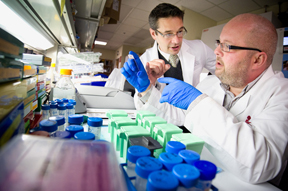CERN Project III: Developmental Therapeutics
— Categories: Press Release Posted on August 5, 2013
Under the leadership and guidance of Dr. Richard Gilbertson, head of our pediatric research efforts, the Project III: Developmental Therapeutics Team has already generated a vast amount of knowledge that is paving the path for a better treatment and cure for ependymoma.
 Mission
Mission
The mission of Project III is to screen literally thousands of drugs, both new and already approved, and combine those results with the information gained from the CERN Foundation clinical trials (Project I) and tumor profiling research (Project IV).
Goal
Our goals with this project are to tailor and develop new cures for all types of ependymoma resulting in individualized treatment for patients.
Overview
The CERN Foundation researchers have generated mouse models and cancer cells that we know are an accurate representation of human cancer cells and tumors. The mice in our research lab receive the same treatment as patients beginning with surgical resection, chemotherapy and radiation therapy.
This research has led us to the identification of different subtypes of ependymoma, not before identified, and is helping us to move away from treating ependymoma as a singular disease with a singular treatment.
In addition, the CERN Foundation’s Project III team has already screened over 7,000 compounds, to help us identify drugs for use in our pediatric and adult clinical trials. These high throughput screenings allow us to look at cancer cells as a “lock” and each of the different chemicals and compounds as potential “keys.” Our researchers are constantly trying different “keys” to unlock these cancer cells. The screening process provides us the ability to be better informed when introducing a drug to be used in clinical trials, saving precious time for patients and clinicians.
What’s on the horizon: Repurposing and New Drug Development from Chemicals found in Nature
Just like 5 FU (the drug being used in a phase I trial at St. Jude Children’s Research Hospital), the CERN Foundation researchers have a series of compounds that are being repurposed, as well as drugs that have already been developed but are not currently being used in cancer. Repurposing of FDA approved drugs and compounds dramatically reduce the time it takes to bring those drugs to trial.
Behind that, we have a collection of 5-6 drugs that have completed the entire screening process and look very promising. Our hope is to take those drugs, beginning as early as the next few months, and bring them to the clinic through the CERN Foundation Clinical Trials
Our long term goals are focused primarily on high throughput screening of completely new chemicals and compounds found in nature that we believe may be useful to turn in to drugs to treat ependymoma. Nature can be viewed as a large synthetic chemistry lab with chemicals we haven’t determined, yet, how they work and how they can be developed to benefit patients diagnosed with cancer.
With the help of the CERN Foundation team, and the phenomenal resources at the St. Jude Children’s Research Center’s in house chemical biology and therapeutics lab, we will continue our efforts to provide innovative and individualized treatment options for patients diagnosed with ependymoma.
